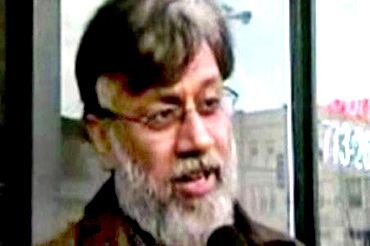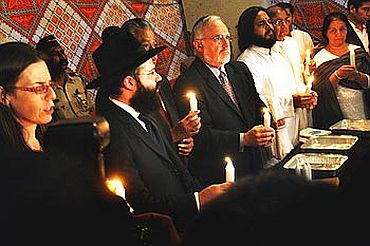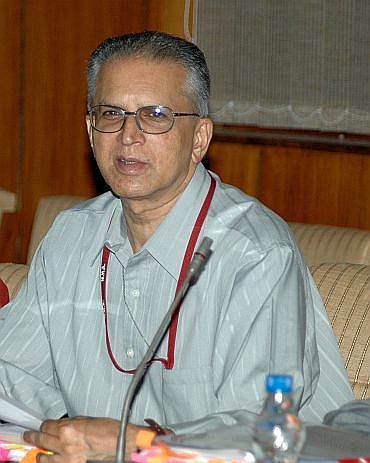
As the Chicago court prepares its verdict in the case of Pakistani-American terror accused Tahawwur Rana, Indian agencies wait with bated breath for the result.
Speaking to some of the persons who have been watching this trial closely, one gets the impression that it has been quite a damp squib.
What they have to say is this: "We expected more on the Inter Services Intelligence (Pakistani spy agency -- accused of playing a role in the 26/11 terror attacks in Mumbai) angle to the case and at the start it looked promising. However, over a period of time, it started to fizzle out and the case is back to the basic facts which were already known."
For India, nailing the ISI link is extremely crucial since this appears to be the toughest part of the case. There is enough evidence against the Lashkar-e-Tayiba and its players and this is a fact that has been accepted world over.
..

However, it would have been a fitting case if both American LeT operative David Headley and Rana had spoken with the same steam about the ISI links to the 26/11 attacks.
Around 15 days before the trial, Rana had confessed that he was an operative of the ISI and it was the agency which staged the entire attack. But this confession was not admitted in court.
India did expect Rana to speak out the same thing during the trial, but he decided to sit mum and await the court verdict. Headley, too, had started off with the same vigour about the ISI, but then completely turned it on the Lashkar towards the end of his testimony.
Indian agencies say that this turnaround has hurt the Indian case. If the two of them had stuck to their earlier versions regarding the ISI, then the court would have had something to say about the ISI role.

"When it comes in the form of a verdict, especially from a court in the United States, it always carries more weight. We know for a fact that it wasn't that only a part of ISI was involved in the case. Although Headley claims that only a few majors were involved in it, there is no way in which the ISI top bosses did not know about it," feel sources in the intelligence agencies.
However, India does not want to lose hope in this case. A consultation process is underway to implead India in the lawsuit at New York filed by the relatives of Rabbi Gavriel Noah Holtzberg and his wife Rivka, who were killed at the Chabad House in Mumbai during the 26/11 terror attacks.
In the suit they have said that the ISI has long nurtured and used international terrorist groups, including the Lashkar, to accomplish its goals and has provided material support to the outfit and other international terrorist groups.
India will pin its hopes on this case since the New York court appears to have taken the case against the ISI more seriously when compared to the Chicago court. The court had issued summons to the ISI officials as well as leaders of the Lashkar.
However, there appears to be some procedural hassles at the moment with Pakistan deciding to go all out in defending its spy agency. However Indian agencies say that should not be too much of a worry since everyone has a right to defend themselves.
While the consultation process is underway on whether to implead in this case or not, a final decision would only be taken once Rana's verdict is out.

India does have some expectations out of the Rana trial, the conviction of Rana being the first. They would also like to see stringent action being sought against the ISI officials and also the court making an observation on the larger role that the spy agency from Pakistan played during this attack.
Home Secretary G K Pillai points out that Rana's conviction would establish the credibility of an ISI link in the case. These papers would then go to the New York court and this would add to the pressure.
At the moment there are two opinions about joining the suit at New York. India does feel the need to speak out its version on the ISI in a US court. However, the only danger would be if the court doesn't find fault with the ISI, then India will tend to weaken its case in the international community.
The opinion is that India should be willing to take that risk.
"A final decision can be expected in the next 20 days. Once the verdict at Chicago is out and the case papers are studied, would a final decision on joining the suit come out," sources also add.